Nick LeRoy has verified Derek’s revenue via tax documentation.
Get an email alert each time a new podcast episode goes live!
Introducing Derek Jacobson
Derek Jacobson, owner of Emerald Consulting is a freelance SEO consultant since 2014. Derek reached out to me shortly after publishing the Ronell six-figure freelancer post and immediately caught my attention. Not only did he meet the six-figure income requirement but he told me he did it nearly exclusively through Upwork!
Little did I know that Derek and I live really close to each other so we met up for beers prior to this interview. Even more baffling is that during our in-person we had discovered that we had a very brief career overlap at an organization prior to both of us going freelance!
I want to thank Derek for agreeing to be my guinea pig as I launch the first-ever Six-Figure Freelancer PODCAST episode.
View Derek’s top-rated upwork profile
Connect with Derek directly on Linkedin
If you are interested in being a future SEO Freelancer podcast guest? Please email me directly at Nick@nickleroy.com
Podcast Transcription
Nick LeRoy 0:02
Welcome to the SEO Freelancer podcast. I'm your host, Nick LeRoy. Each month I'll be interviewing one freelancer to understand their freelance journey and how they've been able to make over $100,000 in one year. Let's not wait another minute and let's jump right into this interview.
Nick LeRoy 0:40
Derek, you've made over $450,000 from Upwork with your SEO career, is that true?
Dereck Jacobson 0:47
Yes. Yeah, just over 450,000
Nick LeRoy 0:51
That's awesome. Can you do us a favor? Can you just introduce yourself a little bit, give us a little bit of a description of your background and how long you've been freelancing.
Dereck Jacobson 1:01
I'm Derrick Jacobson. I've been doing SEO for 12 years professionally. 15 years total doing it on the side for getting getting into the real world. reopened Minnesota. Graduated from St. Thomas and I am the founder of emerald consulting is an SEO consulting firm.
Nick LeRoy 1:22
So walk me through a little bit so you said you went to college? One I'd love to hear first and foremost how relevant you think that is to an SEO career. And then to walk me through a little bit what your first full time job was on a school and if you feel comfortable Share with us your starting salary.
Dereck Jacobson 1:40
Yeah, absolutely. So um, I actually probably I didn't learn anything for when it comes to SEO of from college. I think college is great for certain things, but when it comes to really getting that technical expertise that you kind of need from SEO. Yeah, I don't I didn't get a lot of value there. I was basically self taught. I learned how to do SEO as I was trying to promote a landscaping company that I ran in college. Once I actually graduated, my first job was at fine law, so part of Thomson Reuters. So I make $19 an hour, basically just claiming and optimizing local businesses for law firms all day. So
Nick LeRoy 2:21
Derek, and I actually had a very brief overlap at fine law at a time and that was my second job out of college, so small world. And funny enough, Derek and I didn't even meet really until after we started this podcast, and he had emailed me to be on it. So it was fun to see that there was local and that we had overlap without even really knowing that.
Dereck Jacobson 2:48
Like everybody kind of gets their start in SEO at Thomson Reuters that find law. So many people I've worked with started or had at least some experience with them. So it's kind of a niche market.
Nick LeRoy 3:00
So with that in mind, when was it that you decided that freelancing was an option for you? Were you freelancing, part time as you were working at Biola? Or another job or your what's kind of your story with freelancing?
Dereck Jacobson 3:14
Yeah, so I've kind of always had that entrepreneurial mindset. I've always wanted to start a business or make extra money on the side. That's personally why I got into landscaping in college. It was a better way to make money than just doing a job working at McDonald's. And funnily enough, it was during I think it was 2014 I bought a Tony Robbins masters, money masters DVD series, and that's how I got started with freelance. I think he was interviewing Russell Brunson. And he was mentioning this place called oDesk, which actually turned into Upwork. He hired like a freelancer to design his website or greerton zine or whatever it was. I can't remember. And I was like, build my website. And so I checked out oDesk and realized that I could actually create a profile there. And that's, that's really where I learned that I can. There's a market out there for freelancers, and so right after watching that DVD series, jumped on there, start re that profile and get started.
Nick LeRoy 4:15
Awesome. addition to your nine to five job or did you already commit to the freelance life full time and then just went straight through oDesk or what is now
Dereck Jacobson 4:24
Upwork? Yeah, so that was I was doing that part time. So I was working at target at the time. And so I was basically moonlighting as a freelancer half the time when I was working there. So the freelance part time for about three years before I decided to make it my full time job.
Nick LeRoy 4:42
Tell us a bit more about your process and joining up work, you know, what was the process and just getting signed up? You're starting to get some projects, as well as would you recommend Upwork as a platform for people that want to start freelancing?
Dereck Jacobson 4:57
Yeah, so setting up a profile, getting set up with Upwork is very simple. It's kind of like setting up your LinkedIn profile. You go and you sign up, you give them your basic information. You can input anything from job experience to past clients, and then you can put a description of what you do, what products you offer. And so that part's very simple, actually. Getting the clients and getting getting freelance gigs is obviously a little bit more difficult, but I would highly recommend anybody that's trying to get into freelance to at least give up work to try theirs. It is the largest marketplace for freelance jobs out there. So yeah, I mean, this you know, that's where I got started. That's where I still get the majority of my leads. So I would highly recommend it for anyone just starting out.
Nick LeRoy 5:47
And that's awesome. Let's kind of jump right into what I think might be a misconception with Upwork. I think a lot of people assume that individuals on Upwork are potentially overseas or working for a really cheap rate. What do you think is the perception of Upwork as a whole and they do have any issues be able to charge reasonable rates?
Dereck Jacobson 6:11
Yeah, so there's definitely kind of that Miss, conception of Upwork on on that front. I mean, there's definitely those the cheap jobs that people you know, there's always gonna be the company's clients that just want to work regardless, and those aren't the ones that I want to work with. But from from one marketplace, I would probably put Upwork at the top you know, there's there's fiber there's freelancer.com and a bunch of other ones that there's definitely a lot more tailored towards the the cost saving market.
Nick LeRoy 6:46
Would you recommend Upwork to others?
Dereck Jacobson 6:50
Yeah, I would definitely recommend Upwork to anybody that's just starting out. Freelancing is a great opportunity to get get your name out there. You know, there's 1000s, you know, hundreds of 1000s of job opportunities on their platform. And they have all types of experience levels too. So there's companies looking for highly experienced people, but then also entry level, freelancers. So there's, there's really an opportunity for everyone.
Nick LeRoy 7:19
And you had mentioned that were several competitors to Upwork as a freelancer and you know, even previously, you know what oDesk was? Is there something about Upwork specifically that you enjoy? Or do you actually recommend being available across multiple platforms?
Dereck Jacobson 7:36
Yeah, so when I first started out, I was trying to sell for as many of these online marketplaces as possible, but then I realized it's hard to really manage all of those different clients. So I really focused on Upwork because it was the highest quality, there's the highest quality job there. They had more clients or more potential employers there than any of the other ones. And I also didn't feel like it was as cheap there wasn't as the of the sort of sees workers competing for for jobs. I
Nick LeRoy 8:11
think of Upwork and my limited experience using it as they do, to my knowledge, have some high fees. Can you walk us through a little bit how that works? And does that play a role in your rate on Upwork? Or potentially the projects that you'll take?
Dereck Jacobson 8:26
Yeah, so off work. Similar to the other ones, they do obviously have to make money so they have their service fees. I think the way that they structure it is for the first $500 for any client that you work with, they charge 20% And then from $500 to $10,000. It's a 10% fee, and then above $10,000, it goes down to 5%. So I definitely factored that into a job that I take on. I actually charge more for upward clients than I do for a non Upwork ones just to kind of counterbalance that out of service fee. I also have a minimum requirement that I take out so I I won't take on a job that's less than point $500 Total just because it'll make sure that I'm not paying too much towards that service fee at the same time upper gives me a great opportunity to work with clients throughout the world. Really so to me, it's it's worth the fee. There's definitely things that yeah, it's not it's not fun paying, you know, 20% but it's it's kind of just a necessary evil.
Nick LeRoy 9:32
And correct me if I'm wrong, Derek, I believe you had told me offline. There's like a guarantee to getting paid. Is that correct?
Dereck Jacobson 9:40
Yeah, yep. So the way upward works is if you're working on an hourly rates, they you're guaranteed to get paid for the hours that you put in so you start the clock, the timer. And if you if you're monitoring that time, as guaranteed that you'll get paid for the hours that you put in.
Nick LeRoy 10:03
So as someone who's maybe starting out, you know, that could be one of the biggest benefits and you and I both know you're outside of these platforms, there's no guarantee that you get paid unless you're going to have your fee up front. So I suspect that that takes a significant risk out of the situation that could make Upwork you know, more palatable for individuals that are you know, just trying to start off
Dereck Jacobson 10:29
Yeah, absolutely. That's you know, that's definitely one of the key factors to up work or what I said there something that I really enjoyed about that is you literally get paid each week. So once you get started You work a week you wait the week as the client reviews your work, and then week later you get paid so you're getting a paycheck basically every single week if you have repetitive jobs on there, so that's nice and is guaranteed. Now, there's a drawback of that is a forecast, monitor your work and so they're taking screenshots, checking how many keystrokes you have most clicks, and that can be not exactly the most fun way to work. Yeah, it's
Nick LeRoy 11:11
definitely a balance but yeah, as somebody who has been stiffed on payments before and you know, I've had situations where 567 grand has been 4567 months late. You know, that's just one of those things where when you go freelance, you know, you don't have that type of security net. So while up work does have some additional costs. It is good to see that there's an upside to it as well. You still get to kind of be free in this consulting and freelance world, but you have some structure of regular income, assuming you get the projects.
Dereck Jacobson 11:48
Yeah, yeah, absolutely. And even when you're working with clients offline, you can have great contracts. They even they can be guaranteed contracts. But as you know, as a small business, if they don't pay it's usually not worth calling small claims court to try to get paid if it's you know, only for a couple $1,000. So
Nick LeRoy 12:06
that kind of goes back to post that I'm in the process of writing. It's like having reserves is just critical. I mean, it's really easy to sign these contracts and just kind of write on a calendar when you're getting paid. But the reality is until it lands in your bank account, you have not been paid.
Dereck Jacobson 12:25
Exactly. Yeah. You don't want to be you don't want to enforce all the contracts. You don't.
Nick LeRoy 12:29
Yeah. So let's go pass up work and let's just talk about freelancing. as a whole and making that first $100,000 in a year. I mean, that's a huge milestone to hit. You know, when when did you hit that? Like, how long was it after you started freelancing?
Dereck Jacobson 12:48
Yeah, so I started freelancing, part time in 2014. I did that for about a year and a half and then officially, went on my own in middle of 2016 and took me about six months. So actually 2007 was the first year that I hit 100k for the full year. So almost my, you know, a year and a half in I was able to hit the 100k mark,
Nick LeRoy 13:13
almost exclusively through Upwork, or was that 100% Through Upwork. So
Dereck Jacobson 13:19
that time I had one contract is actually with 3am. And so that was a part time contract. So I was doing full time freelancing with that contract. And so it was a combination of the two. And then 2018 was the first year that I hit hard K through artwork, and I was pretty much exclusively upward buttons that I hit that mark with.
Nick LeRoy 13:41
So that's just proof right there that you don't have to work for $10 an hour on Upwork to make freelancing work. Yeah, there's real money to be made. And Derek has shown us that this is the case. Congratulations on that, by the way. Thanks.
Dereck Jacobson 13:55
Yeah, I appreciate that. And yes, I mean, I Yeah, any anyone that's looking to get into freelance the thing, the number one recommendation I have is make sure that you're not trying to compete on price that's just that's not the way to go. You should value your time and the work that you do.
Nick LeRoy 14:12
And moving forward is up work still your plan of you know, continuing to be a significant role for your revenue or, you know, is it something you plan on moving out of, you know, what are some thoughts there?
Dereck Jacobson 14:26
Yes, so, right now, I would say Upwork is about 50% of my total income. I do get it still proud to say that 75% of my leaves are through Upwork I don't see myself taking getting rid of Upwork but I am ideally trying to move a little bit more towards clients that are off off of work just because I don't want to continue to have to pay that. That that fee, but yeah, I do see for the foreseeable future. I'll continue with Upwork it's been a great source of leads and expected to continue that way.
Nick LeRoy 15:04
You know, build out your profile, you'll continue to get good ratings and show that you're a reliable asset. You know, people are only gonna want to work with you more and more.
Dereck Jacobson 15:14
Yeah, yeah, absolutely. I mean, it's really a snowball effect. So when you first start out with awkward landing that first job, I mean, I think it took me three or four months. And the second job was probably another month or two, but it's, you know, like a snowball effect mentioned it just gets easier and easier. And now I no longer have to actually apply to most of these jobs and most of the clients are coming to me asked me for help which is a lot better than having to constantly create new proposals and set and submit job proposals to so on there. I
Nick LeRoy 15:45
love that. But let's jump into freelancing full time. So when you started you had obviously worked nine to five before, but what would you say was the most difficult aspect of going out on your own?
Dereck Jacobson 16:00
So I say there's two things. The first thing was being a freelancer when you're doing full time it can be very lonely, right? I mean, when you're working your nine to five job typically you're in an office, you have a bunch of co workers, you're you have a lot more human interaction. Whereas when I went full time freelance, I was basically working and living out of my condo so I was there 24/7 Almost and that gets very lonely. And so that was that was definitely a big struggle. I was able to kind of balance that with getting an office and rent it on we work office for a few years, which was nice. I really helped for no more on the social aspect of things. And then the other struggle is obviously not knowing exactly where your next job is gonna come from. There's always always a little bit worried a little bit more worried about your financial situation, making ends meet and all that. So there's more stress when it comes to freelancing.
Nick LeRoy 16:58
Right. And, you know, you've done freelancing before the pandemic and obviously now during the pandemic would you say that the loneliness is that, would you equate kind of pandemic situation to how you felt back then? And has it gotten easier with a pandemic to be able to handle it or walk me through a little bit?
Dereck Jacobson 17:18
Sure. Yeah. So yeah, I guess the pandemic sucked in the sense that I had to give up my office and work remotely or work from home again. The good thing was I was used to it but a lot of other people weren't so when those virtual happy hours with friends was something that you actually look forward to.
Nick LeRoy 17:38
So you go freelancing full time, you know? You're kind of figuring out where the bumps are, you know, at this point, is it safe to say that you're probably making more money than you have in your previous nine to five jobs as well?
Dereck Jacobson 17:52
Oh, absolutely. Yeah. more than doubled my income on a yearly basis since I've moved full time to freelancing, especially over the last few years. There's just a lot more opportunity there. You're, you're actually paid for the work that you do instead of just having your salary and yeah, yeah, it's definitely a lot more lucrative.
Nick LeRoy 18:18
And that's the thing that I love. It's like once you're able to figure out how it works and that you have the skill set to really support this lifestyle. You know, the amount of money that you can make really is limitless. But what you do find in my own experiences, you try to balance you know, do you want to be stuck working 24/7 to maximize dollars in your pocket? Or do you really want to maximize the amount of time with your other hobbies? And with that, I'd love to just jump right into when we compare hours to hours. You know, where are you right, working more now, as a freelancer than you were nine to five? Or how are the changed over the years?
Dereck Jacobson 18:59
Yeah, so when I 95 rules I had they were mostly contract jobs. So once I hit that 40 hour mark, I was done. I was out. It wasn't gonna work any more than that. Now, I initially did full freelance full time. I probably wasn't putting in the 40 hours, mostly just because I didn't have enough client tell base up so I didn't have enough hours to work with those. And then there's only so much you can do if you're not doing client work. So I was probably only putting in close to 30 hours when I first went full time. Now, probably closer to 50 to 60 hours depending on the week. I work probably six to seven days a week. Weekends usually put in a couple hours. Unnecessarily because I have to but it's something I enjoy to do and if I have a little bit of free time, something that's something else to do, especially more than than winter is when it's cold outside.
Nick LeRoy 19:56
Here in Minnesota for everybody who's not aware, it gets blistering cold. You know we have what feels like 10 feet of snow I admittedly do a fair amount more freelancing projects during the winter. And then I try to scale back in the summer.
Dereck Jacobson 20:14
Yeah, absolutely. I golf a lot in the summer. So it's the one nice thing about freelancing is if I have a friend that calls and wants to golf in the afternoon, I'm always free was able to hit the links.
Nick LeRoy 20:25
And you know, you bring up a really good point I'd love to hear your thought on this. There's this idea of nine to five work where we know we kind of have to be button seed for even a remote world you kind of imply you're here the whole time. But when you went freelance for me personally I really kind of adopted that nine to five world in freelance. And as I've been doing it more and more I continue to pull back and I can do what you said I can meet you for you know around a golf for a long lunch. But how was making that adjustment for you? Like you said, if you're not working you're not getting paid? So where you always kind of working nine to five regardless.
Dereck Jacobson 21:04
Yeah, so when I was when I started out, I try to keep it just the same as my the nine to five jobs. So I would start at 730 and I would go until four or 435 o'clock at night, and I still do that for the most part most days. That's my schedule. But I'm also you know, if there's something I would rather do I need to go get groceries or I need to go get the oil change. I just do that at a random time. So there's just a lot more flexibility in the schedule. But I also think it's important to have a set schedule. You know, when I first started out, I thought that I would just wake up whenever I want to turn on the laptop, fire that up and start working on for a couple hours, go. Go do something else and come back. realize pretty quickly that that's just not the way it works. If you really want to be successful in freelancing you do have to treat it as a full time job.
Nick LeRoy 21:57
Hopefully 100% I do think you will agree though, there's something about having to run to the bank or the grocery store like 1pm on a Tuesday. That is just amazing compared to every other hour of the day, people and
Dereck Jacobson 22:12
it's so nice. Most people that know me know that I don't have a lot of patience. And so like sitting in traffic is not something I like to do. I usually when I was working my nine to five I started at 7am Just so I wouldn't have to deal with traffic as nicely my freelancing is yes you can do your errands in the middle of the day when other people are working. It's a lot less it is
Nick LeRoy 22:32
just another kind of freelance life. Exactly. So continuing with comparisons to nine to five roles. Talk me a bit about stress. What do you what do you think? Has it been progressively worse? You know, as you freelance more in comparison is a better?
Dereck Jacobson 22:51
Yes, so freelancing is definitely a lot more stressful, but part of that is because I make it more stressful when I when I went full time freelancing i i wasn't working that much. So it wasn't all that stressed about the amount of work I had. But I was stressed about like I mentioned before, making sure that you you can pay your mortgage, you can buy groceries and everything you're making ends meet. Now I am more stressed because I have not you know my plates constantly fold so I tend to bring on new clients more often than I should. But and so I'm constantly stressed with the amount of work but at the same time. That's you know, I'm doing that to myself. I think there's there's a balancing act that you can you can definitely have where you're not. You don't need to keep working constantly, like I tend to do
Nick LeRoy 23:48
offline before jumping on this. Vacations. It's a whole nother experience when you're a freelancer versus nine to five where you just kind of throw you're out of office on it and you'll be back in a week. You walk me through a little bit how stress plays a role in the vacations you're taking or maybe when you're not taking.
Dereck Jacobson 24:07
Yeah. So as a full time employee with the PTO is great. You get to go on vacation, you're getting paid you're not worried about anything you just completely shut down for a week, whereas relaxing is a vacation is almost more stressful, at least for me. Just try and get everything done before going on vacation. Dealing with clients when you're on vacation as much as you can tell them that you'll be offline and working on pockets. They kind of still expect you to respond to emails if they have an emergency like I I recently had. And then getting back into things that seems like there's things pile up and you get back and you're even more stressed out after your vacation. So it's nice to take a vacation whenever you want, but at the same time, we have to deal with all the clients and everything so it's never really shut down
Nick LeRoy 24:56
completely. So so far we have about six checkmark than the freelancing is awesome. But we finally have our first one where maybe it's starting to inch a little bit towards the be really cautious and prepared. Be joining a freelance world if you love your vacations. Yes, yes, absolutely. I will say I may be one of the rare people that I don't mind a workstation. And what I mean by that is I'm plenty of times where you know for instance, we rented an Airbnb up north a couple hours so we can just install the ice fishing here in Minnesota with my kids during their spring break. But what I did is I woke up and I worked a couple hours every morning while they were just kind of you know, eating the breakfast getting ready for the day. And it really just allowed me to still be connected. But then when I was done you know, I was able to kind of push off anything more until the next day. So there is definitely ways to balance that and I suspect that all freelancers and consultants have different ways to approach it. Some will definitely be flat out. I'm not available. Some people may be like you Derek, you are available. Whether you like it or not, you know, I think this is a big learning opportunity. Would you agree?
Dereck Jacobson 26:10
For sure. Yep. I and I basically take the same approach to if I'm taking a vacation I'll usually wake up and I might work, you know, an hour or two each day at least get the important stuff out of the way respond any emails, there's any fires you have to put out. Take care of that. And then you have the rest of the day to tinge. I was trying to enjoy the vacation thinking about client needs.
Nick LeRoy 26:32
Last question about nine to five. So this is kind of the million dollar question here. And I love Eli's response to my last interview with him as well but his but would you ever go back to a nine to five role? And if you were like what makes it attractive or what specifically would prevent you from going back?
Dereck Jacobson 26:50
Yeah, there there's probably not enough money for me to go back to a nine to five personally I am. I consider myself highly driven, highly motivated. But I'm also not motivated to make somebody else's dream come true. Right. If I'm going to work hard, I want to make sure that I'm the one the beneficiary of it so frankly, I probably wasn't a great employee. I was always looking for how I could improve my career and not so much somebody else's. So yeah, I don't I don't ever see myself going back to the nine to five.
Nick LeRoy 27:27
Yeah, I suspect that's going to be a common response to for people that I continue to talk to, you know, it was really Eli's saying that when he wants to continue to be challenged or is given an opportunity to be challenged in a way that, you know, his current career is not allowing him that really made me kind of take a step back and think about it myself. But I'm really there with you. I would love to think that I was a perfect employee. But, you know, anybody who's listening to this that knows me or even managed me knows that I'm certainly not easy to work with. So I'm with you, Team freelancing. But the reality is, is I guess there's ever a day where I wasn't able to provide for my family. Now it certainly is not a bad choice to have to go work for someone else. Of course, absolutely.
Dereck Jacobson 28:14
Yes. I mean, you know, if I were to lose all my clients, that's a different thing.
Nick LeRoy 28:20
So Derek, as we kind of wrap up this podcast here, What recommendations would you have for aspiring freelancers, you know, there's people listening right now that are kind of questioning, you know, should I freelance, you know, what do you think about part time freelancing? Like, what recommendations do you have you have books, courses, anything along those lines that you'd recommend?
Dereck Jacobson 28:41
Yeah, so um, first off, I'm saying if if you're thinking of freelancing, go for it. At least try do part time. You know, I started I wake up at 430 in the morning, put in a couple hours for for I freelance clients and work at night. It's even if you're not looking to do it full time. It's just extra income. And maybe you will enjoy it. As for courses, or your biggest thing I would recommend is if find something that you're interested in and try to follow some experts see what they what they would recommend if there's, you know, there, if they have any books or that they're trying to sell or that they recommend, go out and buy, you know, I've spent so much money on different courses and coaching and DVD series like I mentioned earlier, and sometimes it's not worth it. But you know, even if you get one little nugget out of any purchase, it's it's going to be beneficial. So, I'm a big fan of Tony Robbins and so I've you know, I've gone to one of his seminars, I've purchased a lot of his different tapes and everything and, you know, that's that's helped me a lot. But I was constantly looking for new ways to improve and educate myself. Because like for SEO, you can't you can't really go to school to where it's it's you have to constantly be educating yourself.
Nick LeRoy 30:03
Very true. Curious from your perspective, knowing that you've been on the nine to five side and the freelance side for me personally, like any sort of consulting or growth management or growth hack box like I read them, but they didn't really stick but I find that now that I'm running a business, I am freelance full time. You know, for instance, I'm reading the million dollar consult by Ali wise now, and that was recommended to me by Eli, and it's like everything he says I just kind of nod my head and it makes so much more sense to me now as a freelancer. than if I were to have done this even five years ago. Do you say you have had the same approach?
Dereck Jacobson 30:43
Yeah, yeah, absolutely. Um, I think the biggest thing is anytime you purchase something like a book or you know, a webinar or a course is it's really just needing to take action on on it, right. There's so many books that I've read that have great information, but if you don't actually follow through on it, then it doesn't really help you all so the thing that I've learned is, as a freelancer is actually trying to execute or trying to take action on on the recommendations or the you know, the knowledge that they provide.
Nick LeRoy 31:13
Well, thank you, Derek. I appreciate you joining us today for this podcast. Like I said, this is our very first six figure Freelancer podcast. I think it has gone very well. Can you let us know how we can connect with you online or if you have a product or website you'd like to promote?
Dereck Jacobson 31:30
Yeah, I appreciate you having me on Nick. You. There's a few ways you can contact me one is I have my website. It's emerald dot consulting. Or you can reach me at Derek at Emerald consulting.
Nick LeRoy 31:49
This concludes the first ever episode of the SEO freelancer podcast. If you want to be alerted to future episodes, please subscribe at theSEOfreelancer.com





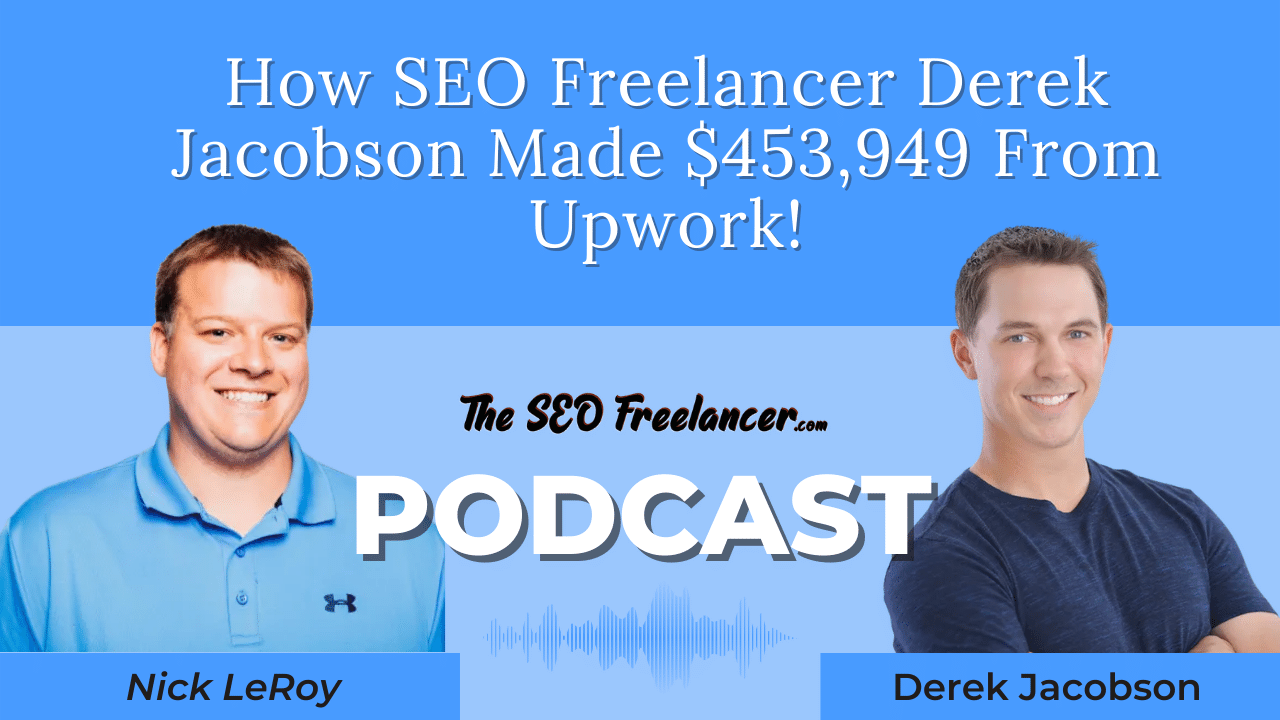


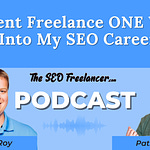
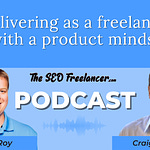
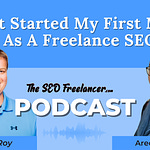
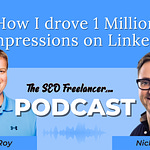
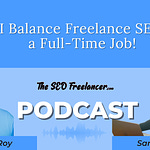
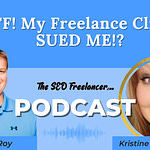
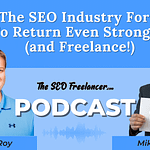
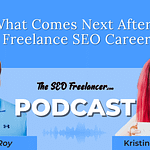
How SEO Freelancer Derek Jacobson Made $453,949 From Upwork!